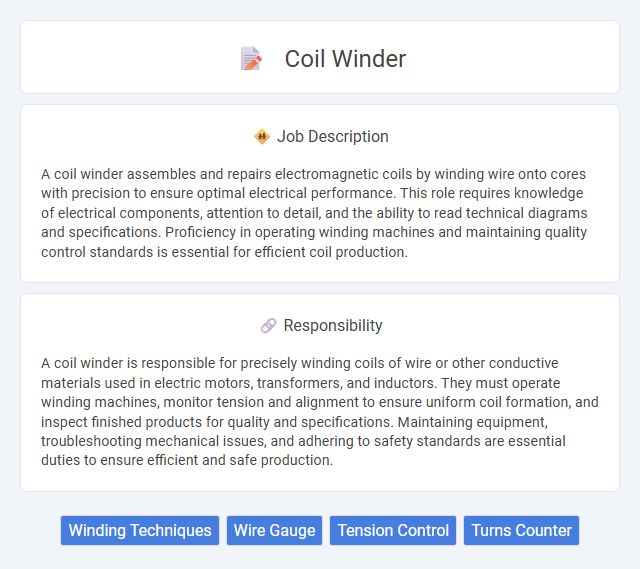
A coil winder assembles and repairs electromagnetic coils by winding wire onto cores with precision to ensure optimal electrical performance. This role requires knowledge of electrical components, attention to detail, and the ability to read technical diagrams and specifications. Proficiency in operating winding machines and maintaining quality control standards is essential for efficient coil production.
Coil winding jobs often require individuals with good manual dexterity and attention to detail, suggesting those prone to repetitive strain or with limited fine motor skills may face challenges. People with strong concentration and patience are more likely to succeed in this role due to the precision needed in winding coils accurately. The probability is lower for those with mobility or endurance issues, as the job can involve prolonged periods of standing and repetitive movements.
Qualification
A coil winder requires technical qualifications including a high school diploma or equivalent, with specialized training in electrical or mechanical fields preferred. Proficiency in operating winding machines and understanding coil specifications, such as wire gauge and tension control, is essential for precise manufacturing. Strong attention to detail, manual dexterity, and familiarity with safety standards enhance performance and product quality in coil winding tasks.
Responsibility
A coil winder is responsible for precisely winding coils of wire or other conductive materials used in electric motors, transformers, and inductors. They must operate winding machines, monitor tension and alignment to ensure uniform coil formation, and inspect finished products for quality and specifications. Maintaining equipment, troubleshooting mechanical issues, and adhering to safety standards are essential duties to ensure efficient and safe production.
Benefit
Working as a coil winder probably offers excellent skill development in precision and attention to detail, which can enhance employability in manufacturing and electrical industries. Employees might benefit from a stable work environment with potential for overtime pay, contributing to higher overall earnings. Opportunities for career advancement and specialized training could also be common, supporting long-term job growth.
Challenge
A coil winder job may present challenges related to precision and attention to detail, as the winding process requires exact tension control and alignment to ensure product quality. There is a probability of encountering technical difficulties with machinery that demand problem-solving skills and mechanical aptitude. Safety risks may also arise due to the use of electrical components and moving parts, necessitating careful adherence to protocols.
Career Advancement
A career as a coil winder offers specialized skill development in electrical engineering and manufacturing, leading to opportunities in advanced machinery operation and quality control. Expertise in coil winding technology can accelerate progression to supervisory or technical specialist roles within industries such as automotive, aerospace, and electronics. Continuous training in precision techniques and machinery maintenance enhances employability and paves the way for leadership positions.
Key Terms
Winding Techniques
Coil winder jobs require proficiency in various winding techniques such as helical, pancake, and progressive winding to ensure precise coil formation for electrical components. Mastery of tension control and spool handling is critical to avoid wire damage and maintain coil integrity. Advanced coil winding machines often incorporate programmable features to optimize winding patterns and enhance production efficiency.
Wire Gauge
Coil winder operators must possess precise knowledge of wire gauge specifications to ensure accurate winding and consistent coil quality. Mastery of wire gauge measurements directly affects the electrical performance and durability of coils used in motors, transformers, and inductors. Proper handling of varying wire gauges enhances efficiency, reduces material waste, and minimizes defects in coil manufacturing.
Tension Control
Coil winders rely on precise tension control to ensure consistent winding quality and prevent material damage during the manufacturing process. Advanced tension control systems monitor and adjust the force applied to the material, maintaining uniform coil density and minimizing defects such as wrinkles or snapping. Optimized tension control improves productivity, reduces waste, and enhances the overall performance of coil winding operations across industries like electrical, textile, and packaging.
Turns Counter
A coil winder operator is responsible for precisely winding wire coils used in transformers, motors, and inductors, where an accurate turns counter ensures the correct number of wire turns per coil, directly affecting product performance. The turns counter mechanism tracks each loop to maintain consistency, prevent electrical failures, and meet design specifications. Mastery of coil winding machinery and meticulous monitoring of the turns counter is essential for producing high-quality electromagnetic components in manufacturing.
 kuljobs.com
kuljobs.com